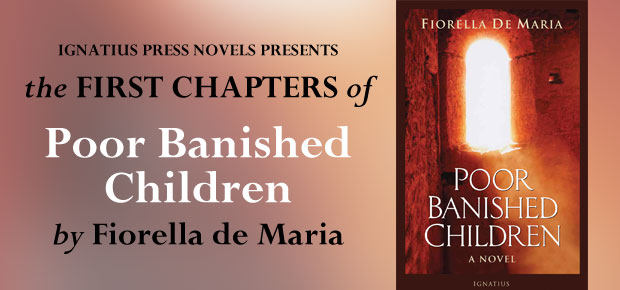
Read the first chapters of the novel Poor Banished Children by Fiorella de Maria. If you like what you’re reading, visit the novel’s page to learn more or order!
Dreams of the Dead
Death has come for me again. The others are already lost. I heard their screams as I was cast into the night; I heard them cursing as they burned or drowned before the roar of the explosion stopped up my ears and I fell into a world of silence. I am burnt by fire and stifled by the black, icy waters that drag me down. There is merciless darkness everywhere, which even the flames tearing the ship cannot pierce. I spin and struggle, raising my head for air as my blood freezes, and I know the sea will take me in the end.
The ship is gone now, and all that remains are burning fragments scattered like votive candles in the night. And I remain—the fragment of a human life, drifting to its close. I am not afraid to die, even though I will die unabsolved, but I am afraid to be alone. I fear the loneliness of the last journey down to the depths of the sea, where I will take my place among the dead, and no one will know that I came to such a pass. There will be no Requiem for me and no resting place, only a troublesome memory in the minds of a few old friends who believe that I died long ago, at the hands of another aggressor.
There are faces all around me; the spectral images of those I have loved dance around my head, taking their leave of me, whilst those I have lost gaze at me in silent accusation. I will die with so many lives to account for, so much blood I never meant to spill, but it cries out for vengeance nonetheless.
Death is so slow in coming that I find myself fighting. If I had desired death as I yearned for it once, I would not have run onto the deck when I knew the end was truly coming; I would not cling now to splintering driftwood, praying that it will hold me. The very motion of lifting my head to take a breath is an act of defiance. I feel no pain, the chill takes away all sense, and I feel only the weariness of death as it reaches out to me. I have died so many times and been returned to the land of the living that I could almost believe I am not meant to go down with the ship—but I am cold. I am cold and weary and cannot draw breath any longer. In the gloom above my head a single star shines. Stella … Stella Maris. I am lost. Stella Maris. I call out to the Star of the ‘Sea but cannot hear my own voice ringing out across the murderous water. Perhaps this is death, then—cruel death from which I can never awaken. I cannot hold onto the driftwood any longer. My hands grow limp and numb with the cold, so that I cannot feel my own fingers as they uncurl.
“Mother? Mother, I am dying!”
“Hush”, says a voice I can hear. “I am holding you.”
Dreams again, the dreams of the dead.
1640—The Devonshire Coast
A group of fishermen found her body at first light. She lay on the beach—her hands still curled around the driftwood that had carried her there, her hair covering her face so that they thought at first she must surely be dead. However, when they turned her over they saw colour in her face, and they were so struck by the sight of her that they carried her into the town to see if she could be saved.
She was unusually small and of such delicate build that Tom carried her in his arms with the ease he might have used to carry a child. “She must have been on that boat” he said, when they reached the tavern and Mary was prevailed upon to come down and let them in. “She’s hurt.”
 They had been woken up in the night by the sound of a distant explosion and seen flames on the horizon when they hurried to their windows to look, but when they had made a search at daybreak she was all they had found. They placed her over a barrel and began striking her back to release the water from her lungs. “A lady passenger?” asked Jonathan, his brother. “She is clothed as a man. Look at her.”
They had been woken up in the night by the sound of a distant explosion and seen flames on the horizon when they hurried to their windows to look, but when they had made a search at daybreak she was all they had found. They placed her over a barrel and began striking her back to release the water from her lungs. “A lady passenger?” asked Jonathan, his brother. “She is clothed as a man. Look at her.”
Her shirt and breeches had been burnt and torn in many places, but she was very definitely wearing a boy’s garb
“Perhaps she was a stowaway?” Tom suggested, but there was no time to consider the puzzle any further. The tiny body began choking and moving; then quite suddenly she lIfted her head, opened a pair of huge, piercing black eyes, and shouted in a barbarous tongue they did not understand. “You have nothing to fear”, said Tom, reaching out to place a reassuring hand on her head, but she could not hear him and thought that she had fallen into hostile hands again. “There now, we are trying to help you.”
But she would not be comforted, struggling and shouting so violently that they almost feared her and Tom could have been convinced that she was not a human being at all. A nymph of the sea perhaps or some other fantastical creature, she was so wild and so perfectly made—except that she was wounded and only a real woman could bruise and bleed as she had done. “What are we to do with her?” he asked when she lost consciousness again, much to their relief. “We cannot keep her.”
Mary backed away. “Do not look to me for help; she cannot stay here.”
“You have room.”
“Ay, for paying guests, not sickly strangers. I am not a nursemaid.”
“Oh, Mary, where’s your woman’s heart?”
“Buried with my husband”, she snapped. She took her shawl from around her own plump shoulders and covered the girl, who was shivering in a feverish sleep. “You should take her to Branton Hall. Lady Alice is a good woman, if a Papist. She will take care of her. Who knows, she may even understand the nonsense she speaks.”
+
“Would it be impertinent of me to ask how this woman came to your house, my lady?” asked Mr. Forbes, when she had dismissed the servant from the sickroom and they were at liberty to talk. As a physician and fellow Catholic, he had attended the family for many years and was Lady Alice’s most trusted confidant, but never had she called him on so strange an errand.
‘Some men carried her here this morning”, she said, seating herself by the window. “They said a ship had gone down in the night—they heard an explosion—and that she had been found on the beach, half-drowned. Naturally I took her in and ordered the servants to care for her, but when they tried to undress her they discovered she was horribly injured and were afraid to do her any further harm.
I did not know whom to trust. Since she was evidently in need of help, I sent for you.”
“And you have no notion of who she might be?”
“None at all. Her dress was so strange; if she had been a man I would have thought she were a pirate, but of course that cannot be. And she is clearly not from these parts; look how dark she is.” Forbes moved away and knelt at the girl’s bedside. The servants had eventually been prevailed upon to strip off her tattered, damp clothes and had dressed her in a nightgown before putting her to bed. She lay now, senseless and trembling, entirely unaware of their presence. “My dear Mr. Forbes, I have hardly considered where she has come from; I have been so worried she might not live.”
He turned to look at her. “Lady Alice, you have reason to fear. This woman has been tormented almost to the point of death. I am quite astonished that she is alive and cannot say with any certainty that she will live much longer. Look.” He would never have shown her what he had found if he had not known how strong she was, but he knew that Lady Alice had been a prison visitor as a young woman in London and there was very little she had not seen, including dead bodies. “If you will forgive me, my lady—” He pulled back the coverIng and turned the girl onto her front, then slipped the vast, ill-fitting gown off her shoulder to reveal fresh dressings. “She must have had her back to the explosion if she was on the ship, but she is quite badly burnt. And there are older injuries I do not like. Here.” He pointed at the exposed side of her face, where a livid patch had spread across her cheek. “That was a hefty blow some days ago, powerful enough to break the cheekbone. Then there are these thin scars all over her body—”
He was cut off by the patient beginning to move; he quickly turned her onto her back again so that he could look at her face more clearly. Her eyes were open and she looked at him in undisguised terror. “Hush now, do not be afraid”, he said, but knew he was wasting his time. She clearly could not understand a word he said.
“What about French?” suggested Lady Alice, but she simply shook her head when it was tried. “Latin?”
To Lady Alice’s surprise, a look of recognition came into the girl’s face. “Puella sum”, she whispered, pressing her wrists together. “Puella.”
“A slave?” Lady Alice knelt by her side to hear her better. “Where are you from?”
Her breathing was becoming laboured again. She struggled to form the word. “Malta.”
“And your name? Do you have a name?”
The girl’s mouth opened and closed as though she could not remember her own name or could not decide whether to trust them with it; then her eyes filled with tears and she shook her head. “Leave her”, ordered Forbes, placing a hand on the girl’s forehead. “It cannot matter now. She has not had a peaceful life; she deserves a peaceful death. Ask your servant to bring me more water.”
Lady Alice turned to leave but stopped in her tracks, hearing the unmistakable gasping and grunting of a dying body attempting to speak again. “Do not speak if it troubles you”, said Forbes, placing a finger on her lips to hush her, but he pushed his hand away, hissing between her teeth. Finally, they both heard one barely distinguishable word: “Sacerdos.”
Forbes let out a long sigh. Quite without knowing it, she had made the most dangerous final request she could possibly have articulated.
If you like what you’re reading, visit the novel’s page to learn more or order!






Ignatius Press Novels | An Interview with Fiorella De Maria
August 11, 2015 at 11:34 pm
[…] three novels you’ve had published by Ignatius Press are quite different; Poor Banished Children is historical fiction set in the seventeenth-century, Do No Harm is a legal thriller, and We’ll […]